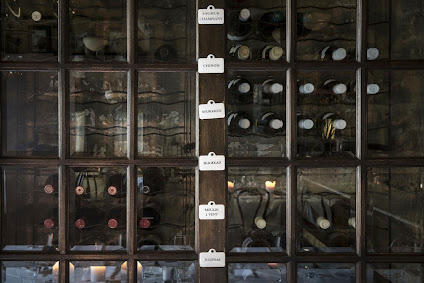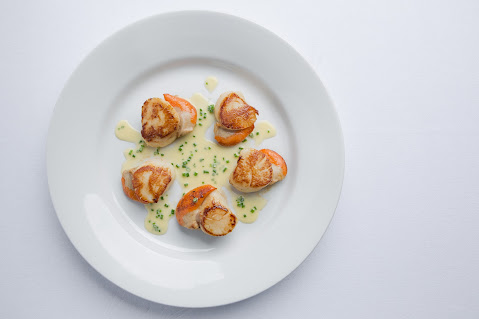Who are you?
How did your passion for cooking start?
I have to say that my passion for cooking started like many of us, at home. My father was a chef and there are chefs and cooks in my family going back generations. It was inevitable that I would enter a kitchen after school, but my granny’s soup will always make me think about how good food can be and how simple it should be. It was delicious–a broth made from a chicken carcase with barley, some vegetables and a few butter beans to fill us up. That was a great bowl of soup.
Where did you train yourself to become a professional chef?
I went straight from school into a kitchen called Casa Dei Cesari close to where I lived with my family in Hampshire. It was a busy, up-market country hotel with a very good Italian restaurant run by a wonderful family. The Chef, Alfred Wagner, took me under his wing and taught me so much in the year or so I was there. I knew this was for me and I wanted to learn more, so I went to college on my day off and worked in all sorts of places. But as chefs, we are always training and learning.
Where do you find your daily culinary inspiration to surprise your lucky guests?
Culinary inspiration can come from many places. A good cookery book perhaps. Or from history, like a forgotten way to cook something, or an old method or recipe. Also watching travel TV shows, visiting markets and watching the seasons as they change. However, sometimes the classics are not to be messed with and simplicity is the key. The produce that arrives in the kitchen also has a big influence as well as visiting farms and growing my own food.
Is there a special reason you called your restaurant ‘Cafe St Honoré’?
Cafe St Honoré is the patron saint of pastry chefs and cooks, and we inherited the name when we took over the business fourteen years ago. We didn’t want to change an already good name as it’s well-established now on Edinburgh’s dining scene. People know it simply as Cafe.
Is there a personal recipe you are very proud of and why?
There are many recipes and dishes we put on our menu at Cafe that I am very proud of. One is our sourdough bread, that we’ve been making for 15 years and has now become quite trendy. Herring, when in season, is something I always enjoy cooking. I cook it the traditional way: dipped in butter and oatmeal, then fried and served with fried potatoes. It is delicious. Also, using oats again, brose is a delicious dish. It’s a type of savoury porridge that I make with leeks and mussels, or with lots of onion, beef fat and kale to serve with braised beef shin. But I do love the classics, beef Bourguignon, lemon tart and crème brûlée. We are a French restaurant after all…
Regarding food, which is your ‘madeleine of Proust’?
It must be a roast chicken. It has such a familiar and welcome aroma that fills our house most Sundays. A humble roast chicken, basted, stuffed with herbs and garlic, basted and with butter perhaps stuffed under the skin can transport me back to childhood. And now that my own children get to experience it, is so special and important. Sitting around a table and enjoying my family’s company whilst eating a chicken roasted in my home is emotional for me in many ways.
You are an Ambassador of Slow Food, the International Movement launched by Italian Carlo Petrini in 1986. How does it involve your way of cooking? Being an ambassador for the Slow Food movement has been my mission for quite some time now. I first went to
Terra Madre Salone del Gusto in Turin in 2006 and it really did change my life. How I cooked, how I bought, prepped, cared for staff, everything changed. I knew I had a job to do when I came home after seeing all these food communities in one place, all so proud of their produce. It made me realise that I wasn’t using enough local, seasonal and organic ingredients. I had been focussing on what other chefs were doing and following the trends of the time. I had failed to see what was right in front of me: fabulous food, people, (“good, clean, fair” food) that encompasses organic, Fair-trade, Rainforest Alliance, sustainability and more. Now I’m passing that on to other chefs, like a missionary does spreading the message of the Bible I suppose.
Is there a chef (male of female) you particularly appreciate and value you would love to cook with?
There are many chefs I admire and would love to cook with. First is Fergus Henderson of
St. John in London for his ability to make simply-prepared food good, and right. Having that confidence comes with experience and intelligence. Second is
Hugh Fernley-Whittingstall again for his love of simple ingredients, perhaps caught or grown by himself, cooked very simply maybe in an old-fashioned style and served with no fuss, just because it tastes good. And perhaps
Marco-Pierre White for his incredible ability to inspire a generation of chefs to try and replicate his dishes. His cool enfant terrible reputation and having the balls to wear a blue striped apron in the kitchen, and of course producing beautiful food. And
Alice Walters, who as an American in the early 70s, changed the way people eat. Her cooking was refreshing, simple and tasty. She is Vice President of Slow Food.
Which is your daily and happy routine in the kitchen with your team?
My daily routine starts off with a chat around the coffee machine with the team as we all arrive. Those few minutes of saying “hey, how are you?”, checking in with them, getting to know them and going through the days business is so important. Showing, teaching and encouraging is vital throughout the day, and giving credit where credit is due. Telling someone something looks and tastes good is something they may never forget. And I do enjoy a lovely coffee made by the wonderful front of house team.
As many colleagues of yours, as a young chef, did you have a mentor who inspired you?
There were many chefs who inspired me and took me in to their kitchens. The first really exciting job I had was at
The Peat Inn in Fife, owned then by the late David Wilson and his wife Patricia. He was brilliant at teaching the classics. He was self-taught but had worked in some great French restaurants including Verge, Bocuse, Guérard. He was quite a character, and loved his wine too.
Which tips would you give to a young girl or boy who is dreaming of becoming a chef and owning her/his own restaurant?
Work in good places, places where you will learn from good people. Work hard and taste as much as you can. Learn where food comes from, become a gardener and join Slow Food. Cook every day and enjoy what you do, don’t overwork yourself. Eat out regularly and enjoy wine. Taste, and learn why it tastes good. Get a good investor who understands your dream.
A simple, quick and tasty Scottish recipe perfect for a Sunday evening
Here is a classic recipe from our shores: Hand-dived Scallops, Chive Butter Sauce
Hand-dived Scallops, Chive Butter Sauce
Serves 2
Allow 3 or 4 scallops per person and leave the coral on (the orange bit).
100ml white wine
100ml cider vinegar
1 sprig of thyme
A few peppercorns
1 bay leaf
1 shallot, peeled and roughly sliced
1 tablespoon double cream
125g cold, unsalted butter, diced into small cubes
Good salt and pepper
1 lemon for squeezing
1 tablespoon finely chopped chives
12 tablespoons cold-pressed rapeseed oil
Firstly, to make a reduction for the sauce, add the shallots, peppercorns, bay leaf, wine, vinegar and thyme to a small pot and bring to the boil. Reduce by two thirds then pass through a sieve into a clean pot and bring to the boil again and reduce by half.
To make the sauce, add the cream to the reduction and gently bring to the boil. Then slowly add the cubes of butter, a few at a time, and start to emulsify the sauce by using a swirling technique with your spoon or whisk. Don't let the mixture get too hot or too cold as it will split.
Season the sauce with salt and pepper, and a hint of lemon juice then add the chopped chives, Set to one side in a warm place.
To cook the scallops, place a frying pan on the hob taking it to a high temperature. Add a splash of cold-pressed rapeseed oil, and ensuring they are dry, add the scallops to the hot oil in the pan.
Cook the scallops on both sides for a minute or two until golden brown. Don't over-cook them or they will become like rubber balls. Remove them from the pan and season with salt, pepper and a squeeze of lemon juice. Place onto warmed plates and drizzle over the chive butter sauce. Serve at once.
All the pictures are Courtesy of Cafe St Honoré
IG
@cafesthonore
@chefneilforbes
Press
@agency_edimburgh
@leemitchellmacgregor
#MCCOTInterview
#NeilForbes
#Scottishchef
#Scotland
#UnitedKingdom
#Slowfood
#Edimburgh
#CafeStHonoré
#Diningscene
#Organicfood
#FrenchRestaurant













